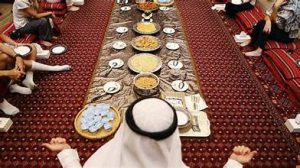Key words: Ramadan, fasting, health, wellness, spiritual reflection, self-discipline, physical renewal, nourishing fast, Suhoor, Iftar, hydration, balanced nutrition, mindful eating, physical activity.

Ramadan is a special month for Muslims all over the world. It’s a time of fasting, prayer, forgiveness, and reflection. During this time, it’s important to take care of your health so you can make the most of the fasting experience. Fasting is a spiritual practice in Islam that purifies the soul and strengthens empathy. It’s a fundamental duty for Muslims during this time. By abstaining from food and drink, individuals cleanse their hearts and become more mindful of the struggles of others. This fosters a sense of compassion and solidarity, reinforcing the values of charity and social responsibility.
In this guide, we’ll share some simple tips to help you stay healthy and feel good during Ramadan. We’ll talk about things like eating right, staying hydrated, and taking care of yourself physically. By following these tips, you can  have a fulfilling and nourishing fast that leaves you feeling energized and connected to the spirit of Ramadan.
have a fulfilling and nourishing fast that leaves you feeling energized and connected to the spirit of Ramadan.
“Ramadan is a time to look within, be kind, and find peace. It’s a special month where we learn to be better people and care for others. Let’s make the most of it by spreading love and doing good deeds.”
- Importance of Suhoor and Iftar:
Suhoor: The morning meal (suhoor) serves as a vital source of energy and hydration for the whole day. It include carbohydrates, protein-rich foods, and hydrating fruits to gain energy levels throughout the fasting period.
Iftar: Breaking the fast (iftar) is an occasion for refilling nutrients and rehydrating the body. Begin with dates and water to restore blood sugar levels, followed by a balanced meal comprising lean proteins, whole grains, and vegetables to nourish the body effectively.
- Hydration is Key:
Dehydration can cause a significant risk during Ramadan, especially in warmer climates. We have to drink plenty of water between iftar and suhoor to prevent dehydration and maintain optimal hydration levels throughout the fasting period. Including hydrating foods such as water-rich fruits (e.g., watermelon, cucumbers) and soups into your meals to supplement fluid intake and prevent thirst during fasting hours.
- Balanced Nutrition:
Choose foods packed with nutrients that give you lasting energy and essential vitamins and minerals. Go for whole grains, lean proteins, healthy fats, and lots of fruits and veggies for a balanced diet during Ramadan. Avoid sugary and processed foods that can make your energy levels go up and down. Stick to natural, wholesome foods to keep your body healthy and strong.
- Mindful Eating Practices:
Practice mindful eating during suhoor and iftar, paying attention to hunger cues and eating slowly and consciously. Avoid overeating or indulging in heavy, calorie-rich meals, as this can lead to digestive discomfort and fatigue. Instead, focus on portion control and balanced meal choices to promote digestion and energy levels.
- Prioritizing Physical Activity:
While intense exercise may be tough during fasting in Ramadan, light to moderate physical activity remains beneficial. Activities like walking or yoga promote muscle tone, flexibility, and overall well-being without straining the body. They also improve blood circulation, mood, and stress levels. Regular physical activity supports metabolic health, aids digestion, and prevents muscle loss, enhancing the fasting experience. We should prioritize our health and wellness during Ramadan is essential for ensuring a nourishing fast that supports physical vitality and spiritual growth. By understanding the significance of balanced nutrition, hydration, mindful eating practices, and regular physical activity, individuals can approach the fasting period confidently. This approach optimizes well-being and allows them to maximize the benefits of this sacred month.


